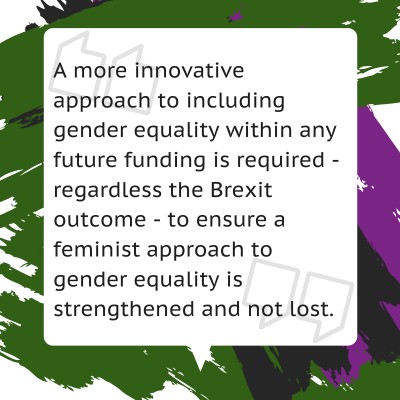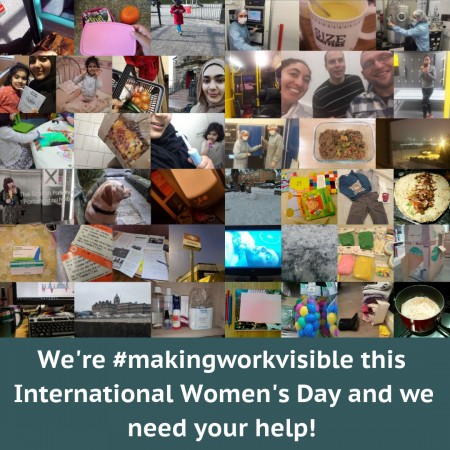Engender blog
GUEST POST: When childcare isn’t affordable, we all pay for it
-400.png)
Katie Dickerson is a New Yorker raising two strong little girls in Glasgow. She is passionate about advocating for the rights of working mothers. You can follow her on Twitter @Katie_Popple for jokes about parenting small children and rants about gender equality.
Here she blogs for Engender about why childcare costs are still a major barrier to women's equality.
I’ll admit it - when I decided to have a second child, I didn’t crunch the numbers first.
I thought about how nice it would be for my older daughter to have a sibling, and how complete my family would feel once there were four of us in it. I was so wrapped up in the warm fuzziness of it all that I didn’t consider how expensive this new kid would be.
My oldest had been attending nursery four days a week, so I was used to eye-wateringly high childcare bills. But it was only when I calculated the childcare costs for two children under five that it really hit me - nursery fees could financially ruin my family.
GUEST POST: Brexit - a risk to women's equality, or an opportunity to reshape gender mainstreaming in economic development?
In the week which has seen a further Brexit extension, we host a guest blog from Leanne Wilson, PhD Candidate at the WiSE Research Centre for Economic Justice at Glasgow Caledonian University. Leanne is feminist economist researching the effectiveness of gender mainstreaming as a strategy for advancing gender equality, specifically within the European Structural and Investment Funds and economic development policies in Scotland. You can find Leanne over on Twitter @LeanneWilson82

'Gender mainstreaming' has been an integral strategy for gender equality within the European Structural Investment Funds (ESIF) since the 2000-2006 funding period. Therefore, with Brexit looming and the risk of losing the strategy in economic development policies there is an urgency to assess its effectiveness. Gender mainstreaming was endorsed by the 1995 Fourth World Conference on Women and has continued to be the strategy of the EU in many of their policies. The UN define gender mainstreaming as “the (re)organisation, improvement, development and evaluation of policy processes, so that gender equality perspective is incorporated in all policies at all levels and at all stages, by actors normally involved in policy-making”.
It is contested as a strategy as it has been widely debated by feminist researchers for its ability to transform structural inequalities. It is argued that it involves two different structures, ‘gender equality’ and the ‘mainstream’ which are conflicting, and in some instances competing, frames. However, I fear that leaving the EU will derail any success it has had, and therefore I want to highlight any learning from the experience in Scotland which will ultimately inform successor funding. This blog discusses my early research findings and opinion on the success of the Scottish implementation of gender mainstreaming in economic development polices and, therefore, the implications post-Brexit.
Celebrating Scotland's Gender Pay Gap Action Plan
-450.jpg)
Our Executive Director Emma Ritch reflects on the feminist journey to Scotland's first action plan to tackle the pay gap, and welcomes a substantial step towards women’s and girls’ economic justice.
Feminist policy advocacy requires determination, grit, and the willingness to work towards sometimes infinitesimal change in pursuit of a different world for women & girls. When we do see what amounts to a leap forward in a long-term, shared advocacy project it’s vital to pause, appreciate the moment, and recognise the women who collaborated over years to see it happen.
Making Work Visible is back – and we need your help!

For the past couple of years we have asked women in Scotland to share their days with us as part of our Making Work Visible project on International Women's Day. This year, our Making Work Visible project is back and even bigger than before.
This year, Engender are running a photography and video project to show all of the different things women in Scotland do. We are looking for people to take part in this photography project to tell us about women’s lives across Scotland.
What's in it for women? Scottish Government Budget 2019-2020

Our Policy and Parliamentary Manager Eilidh Dickson has collated a gender edit of the Scottish Government Budget for 2019-2020, released at the end of 2018. You can read the gender edit here, and in this blog she breaks down the implementation of new budget processes and the potential impact of Brexit:
This year’s Scottish Budget is a little different. For one thing, it’s the Budget that’s come at the Brexit crunch point, where constitutional and economic uncertainty is at its peak. The Finance Minister, Derek Mackay, has been clear that in the event of ‘no deal’ he’ll have to take another look at the spending plans to respond to contingency costs and possibly deliver a supplementary budget.
Downloads
 Engender Briefing: Pension Credit Entitlement Changes
From 15 May 2019, new changes will be introduced which will require couples where one partner has reached state pension age and one has not (‘mixed age couples’) to claim universal credit (UC) instead of Pension Credit.
Engender Briefing: Pension Credit Entitlement Changes
From 15 May 2019, new changes will be introduced which will require couples where one partner has reached state pension age and one has not (‘mixed age couples’) to claim universal credit (UC) instead of Pension Credit.
 Engender Parliamentary Briefing: Condemnation of Misogyny, Racism, Harassment and Sexism
Engender welcomes this Scottish Parliament Debate on Condemnation of Misogyny, Racism, Harassment and Sexism and the opportunity to raise awareness of the ways in which women in Scotland’s inequality contributes to gender-based violence.
Engender Parliamentary Briefing: Condemnation of Misogyny, Racism, Harassment and Sexism
Engender welcomes this Scottish Parliament Debate on Condemnation of Misogyny, Racism, Harassment and Sexism and the opportunity to raise awareness of the ways in which women in Scotland’s inequality contributes to gender-based violence.
 Gender Matters in Social Security: Individual Payments of Universal Credit
A paper calling on the Scottish Government to automatically split payments of Universal Credit between couples, once this power is devolved to the Scottish Parliament.
Gender Matters in Social Security: Individual Payments of Universal Credit
A paper calling on the Scottish Government to automatically split payments of Universal Credit between couples, once this power is devolved to the Scottish Parliament.
 Gender Matters Manifesto: Twenty for 2016
This manifesto sets out measures that, with political will, can be taken over the next parliamentary term in pursuit of these goals.
Gender Matters Manifesto: Twenty for 2016
This manifesto sets out measures that, with political will, can be taken over the next parliamentary term in pursuit of these goals.
 Scottish NGO Briefing for UN Special Rapporteur on Violence Against Women
Joint briefing paper for the UN Rapporteur on Violence Against Women.
Scottish NGO Briefing for UN Special Rapporteur on Violence Against Women
Joint briefing paper for the UN Rapporteur on Violence Against Women.

Newsletter
Sign up to receive our newsletter here:
Sign up to our mailing list
Receive key feminist updates direct to your inbox: